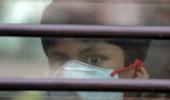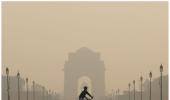'If we want a better life, we have to treat nature better.'
That's nature's message to us.'

"One of the benefits of the lockdown is now people will realise that human beings are one of the main reasons for pollution," says Dr Jayanarayanan Kuttippurath, below, an assistant professor at the Centre for Oceans, Rivers, Atmosphere and Land Sciences, IIT-Kharagpur.
Dr Kuttippurath tells Shobha Warrier/Rediff.com.
After several years, we get to breathe clean air, rivers have clean water, birds are flocking back. Do you think it is the right time to look at what we human beings have been doing to nature?
Yes, the lockdown due to coronavirus has changed the environment around us.
In India, air pollution has been the 5th largest killer. When there is less pollution, we are also saving lives.
One of the benefits of the lockdown is now people will realise that human beings are one of the main reasons for pollution.
I read that we could see the Himalayas from Jalandhar, which is about 200 km away from the mountain ranges! Many people from the older generation said they never imagined they would be able to see the mountain ranges in their lifetime.
But who is responsible for such a situation? Human beings. And you don't need any research or scientific paper on this.
Nature has clearly shown that we did this!
Similarly, the Ganga and the Yamuna are cleaner now, in parts at least. So, who has been polluting the air and the rivers?
We, the people.
Another lesson the lockdown has taught us is we need only weeks or months to clean up some of the mess we have made, if we really want to do the cleaning!
Do you think people will start looking at climate change seriously now?
I think so. We have seen the changes that have happened in nature and environment. Now, people will be aware of what they should not do to the environment.
It has also taught us, we will get what we deserve!
If we want a better life, we have to treat nature better, and behave properly. That's nature's message to us.
Earlier, we needed research to understand nature. For instance, how much pollution was there in the atmosphere? Now, nature has shown us clearly the changes, and it is seen by not only the scientists but people also.
Early this year, your team did a study and found that India's urban cities are turning into heat islands. Is it due to climate change or anthropogenic forcing, that is, human effect like your study said?
It is also due to climate change.
When we say anthropogenic forcing, we mean this; when human beings cut trees, change the surface of the land, and convert that space to more built-up area, that will affect the reflected radiation and modify the surface temperature.
These have contributed to an increase in urban heat in a big way.

When there are more vehicles, more industries, more power plants, more buildings, more emissions, more energy consumption, there is more heat in an area. All these are due to human interventions.
This shouldn't be confused with the temperature in the cities. When we say urban heat islands, it is comparing the cities with their respective neighbourhood.
What happens in the suburban areas also affects the calculation of urban heat island intensity.
What kind of impact will urban areas becoming heat islands have on the suburban areas and the nearby rural areas?
In India real urbanisation started only 15, 20 years ago. In fact, our cities are expanding to the suburban areas. Because there is no planning in the way cities are expanding, whatever happens in the cities affect the suburbs too.
What is needed is a proper plan in expansion of cities like, where are the areas that can expand, which direction we should expand and what are the things that we should not touch while expanding.
For example, if there is a water body or woods, we should not destroy them while expanding the cities.
We just cannot build roads, big industry units or housing colonies anywhere and everywhere. There has to be a clear demarcation of the areas that we should preserve and taken care of.
You spoke of preserving the green cover in cities. Kerala is one state that has a lot of green cover but for the last couple of years, it is reported that the state has become 3-4 degrees hotter. How do you explain this?
Kerala is one state where significant changes are happening in the environment especially in the Western ghats.
What happens in the Western ghats directly affects the climate of Kerala.
But I don't think the temperature must have risen 3-4 degrees in the last couple of years.
Another interesting fact about Kerala is that it does not have any 'villages' now. As I am from Kerala, I can say for sure that most of the areas in Kerala are 'suburban' areas.
Many changes have taken place in Kerala regarding the way houses are constructed now and also the way we treat our land, hills and water bodies.
A number of water bodies in Kerala have shrunk, and many small hills have disappeared completely.
There is less open land, but more built up areas. All these factors have had a great impact on the local climate.
So, it is anthropogenic forcing that has affected the rise in temperature in Kerala...
I would say, Kerala is the best example of how human activities can change the environment thus affecting the local climate dramatically.
For instance, when we had paddy fields, there was a lot more ground water.
Paddy fields made way to cash crops when people found that cultivating paddy was unviable or not profitable, and then to more buildings and structures.
These changed the ground water availability, surface runoff and soil moisture.
This has also changed the environment, temperature and thus local climate in Kerala.
Last year, about two-thirds of India experienced heat wave conditions with unusually high temperatures. Similarly, unusually cold winter too. Do you attribute this to climate change?
It is definitely a sign of climate change.
The Intergovernmental Panel for Climate Change report mentions that in a climate change scenario, we expect more extreme weather conditions such as hotter summer days and colder winter days.
And what we see today are the same things. So, we can say what we are experiencing today is a sign of climate change.
Earlier, for example, three decades ago, we had a normal and then the extremes. And those extremes have become today's normal.
Recent climate models suggest that Earth's climate would be 5.3 degrees hotter by the end of the century.
When even a 2-degree temperature rise could lead to sea level rising, coral reefs dying and water becoming scarce in some parts of the world, how scary is the scenario?
It is a very scary scenario. These are climate model projections for the future.
It is certain that there will be some degree of rise in temperature in future. It can be 4, 5 or even 6 degrees.
It might happen, but we do not know the exact number for sure. These are model projections and there are uncertainties too.
Yes, if the rise is above 2 degrees, it is still a scary situation, which is why scientists are working to fight climate change, how to mitigate the effects and coming up with adaptation strategies.
International scientific bodies and policy makers are also working on this direction, and conducting many awareness programs too.
Though we do not want this to happen, it may happen. That is what the models are suggesting.
It is also said that sea level rising result in water becoming scarce in some parts of the world...
It has already been happening.
For example, studies have shown that the sea level along the Indian coast have risen by 8.5 cm in the past 50 years, with an average increase of about 1.7 mm/year.
In India, water scarcity is a big problem now. There was a time when we had water in the wells and rivers, and water bodies had water even in summer.
Now, the situation is completely different; wells and rivers dry up by the end of winter or early spring in some parts of India.
It is a fact that it is happening, and a rise in temperature has a role in it and also climate change.
- Part 2: 'Climate change is a reality'









